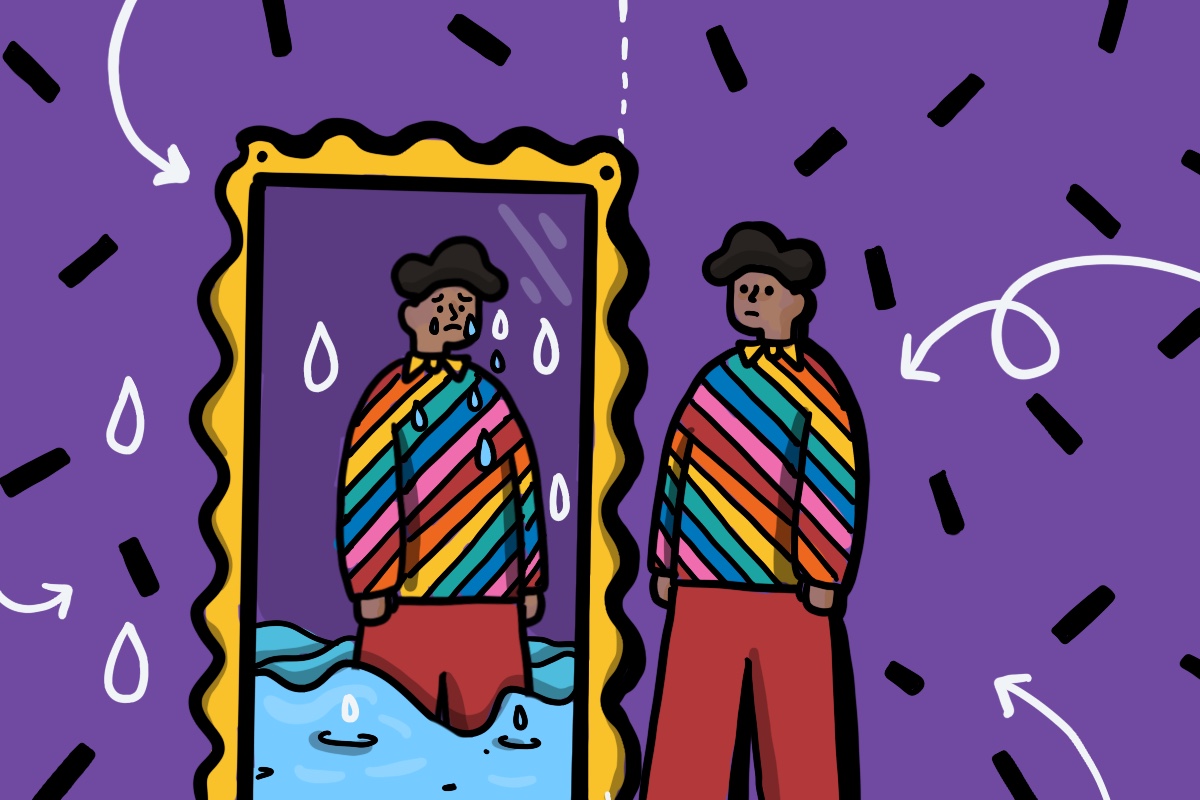
Queeries: Why can’t I cry?
Fagony aunt Aisha Mirza unpacks what it means when you just can't seem to cry it out.
Aisha Mirza
23 Nov 2020
Illustration by Soofiya
“I’m a brown 30-year-old experiencing identity dysphoria, isolation and the inability to cry. I’ve tried listening to all the old songs that made me cry and the last tune that I almost shed a tear to was ‘Keep Ya Head Up’ by 2Pac. How do you cry, and if you can’t, how do you cope with the expectations around it?”
As ways of expressing emotion go, crying takes up a lot of space in popular imagination, you know? She’s kind of a loud bitch, and as such it’s often assumed that when someone is sad, or happy, or somehow tremendously moved in one direction or another, they will indicate so by shedding a tear (or 3,000)!
It’s easy to see why so many people uphold crying as some kind of bastion of emotionz. Crying can be poetic, romantic, cathartic and often relieving, as whatever fuckery is inside us becomes this physical thing we can touch and feel (and snack on if you’re feeling nasty). Tears are pretty and a bit sparkly in the light, like a beauty filter, and they are a way of communicating to ourselves and those around us that we require attention – and the more ways of getting that the merrier imo.
However, in the same way that a wet ass pussy is by no means the only indication that you’re dying for the d, crying is only one externalisation of emotion. Your feelings remain absolutely so, so valid regardless of whether you want to or are able to cry or not.
Not everyone can weep when they want to. For some, the need and ability to cry will be in flux throughout life, as circumstances, experiences and body chemistry change. Sometimes tears will come easy and for others, they rarely or never will. There is no correlation between your pain and your ability to cry. Know that your need for support, love and care deserves to be met by yourself and those around you, regardless of whether your mascara is running or not.
Ask yourself why you want to cry. What sensations or validation or calm or catharsis might it provide for you? Can you get those another way?
“Whether the tears are there or not, on some level the feeling is and that’s what’s important and should be honoured”
For some people an inability to cry will be a product of their early experiences and part of the indoctrination we all receive around what’s right and what’s wrong, what’s weak and what’s strong. Many of us inherit the idea that expressing vulnerability through sobbing or being afraid or sensitive or slow is a sign of weakness.
That’s not true, and there are many cultures that centre grief and sorrow as a form of personal growth and community cohesion. Try to surround yourself with people who make space for vulnerability in all of its forms and won’t shame you either way.
Sometimes in times of hardship the body’s response is not to cry, but to remain as stoic as possible. This can be for many reasons such as a fight, flight or freeze response that doesn’t make space for crying, or as a survival technique passed down through family lineages who never felt safe enough to cry.
There’s also a chance you might be depressed. Sometimes depression is marked by deep sadness and lots of crying, but sometimes it presents as a flattening of emotion and an inability to externalise or even really feel emotion. This is an extremely frustrating and demoralising state of being, and even articulating the things you’d like to cry about, as you’ve done, is huge. Congratulate yourself for that.
When you arrive at a moment or situation you’d like to cry about, acknowledge that, even if the tears don’t come. Treat yourself with the love and tenderness that you would a friend or a younger version of yourself that was crying. Perhaps you could take those moments as an opportunity to journal or tell a friend or even imagine or pretend to cry. Whether the tears are there or not, on some level the feeling is and that’s what’s important and should be honoured.
“A non-crying friend explained that they used to feel shame about their inability to cry but refuse to anymore, reframing it to themselves and others as, ‘I am sad beyond tears’”
I’m not sure about your bawling history but it should also be said that some people just aren’t criers! Disregard any story you might be tempted to tell yourself about this. It doesn’t mean you’re broken or a sociopath or have never experienced anything worth crying about – sometimes it just is what it is, until it isn’t. When I was speaking with a non-crying friend about this, they explained that they used to feel shame about their inability to cry but refuse to anymore, reframing it to themselves and others as, “I am sad beyond tears”.
All that said, if you really are just craving the cry sensation, and it sounds like you are, here are some things you could try:
- Find a safe space to do it and if you don’t know where that is perhaps it’s time for a little experimentation. Try a shower in the dark? A walk in a green space you’ve never been to before? Your car?
- Cut a juicy, ripe-ass onion or two.
- Stay hydrated! Are you urinating your tears away?
- Laugh? I’m curious what would happen if you focussed this energy on trying to laugh instead. Not in a laugh-your-depression-away kind of situation, but maybe as a distraction or a counterintuitive misdirection that gives the unborn tears more space to arrive.
- Check in about any meds you’re taking. SSRIs and birth control both can affect emotional responses – perhaps some careful adjustments could be made?
- Screaming (into a pillow) (unless you’re feeling chaotic)
- Take good care of your body as you wait for it to give you what you need. Meditation, breathing exercises, reiki and massage could all help. Try sitting in a wide-legged child’s pose for as long as feels comfortable. So much trauma and emotion is stored in the pelvis and hips and releasing it can elicit strong reactions.
- Masturbate! Cry-wanking – an iconic duo.
- Engage in regular therapy with a licensed professional. You can speak with them directly about your crying quandary or you can work with them on more general stuff and wait to see if it comes.
- Find ways to engage more frequently and intimately with your inner child. Write them a letter or imagine giving them a hug.
- Watch The Notebook or this rescue video of a scared homeless dog with a broken heart.
- I know you said your go-to cry music hasn’t been working but I’m personally not ready to give up on music as a potential answer to all of life’s problems and so I got some of the melancholy queers in my life to contribute to this playlist of songs that make them cry juuust in case.
- Patience, my dear. I hear that you’re frustrated and caught in this web of old expectations and present needs, but try your best to trust your body – your tears will know when it’s time to flow.








